https://www.youtube.com/watch?v=vmBZ0FuK1Vs
Below is the edited transcript of the video above.
Ocean Robbins: Welcome to this Food Revolution Conversation. I am Ocean Robbins, co-founder and CEO of Food Revolution Network, and we are here today to talk about healthcare, disease symptom management, and the critical difference between the two. We’re going to talk about systems, and why it is that we in the United States spend 19% of our gross domestic product on disease symptom management, but still have the fattest and sickest population in the history of the world. We’re going to talk about the underlying symptoms and systems that create that. More importantly, we’re going to talk about solutions. And we’re doing that with a brilliant doctor who is one of the foremost leaders in the movement to transform healthcare, and to truly promote health for humanity. He’s Dr. Sean Hashmi, and he is a practicing nephrologist and obesity medicine specialist at Kaiser Permanente, Southern California.
Dr. Hashmi serves as the Regional Director for Clinical Nutrition and Weight Management at Kaiser Permanente, Southern California. In this role, he’s responsible for developing a comprehensive obesity management strategy involving lifestyle medicine and obesity medicine for the 4.6 million members that Kaiser Permanente serves. He is driven by a lifelong commitment to be of service to others. He also provides evidence-based health, nutrition, and wellness research through his nonprofit organization, SELF Principle.
Dr. Hashmi and I got to talking a little while back as I was trying to understand what it was that Kaiser Permanente was doing that has put it at the forefront of many of the efforts to transform healthcare in the United States. I wanted to know who was behind that, who was making this happen — because this is a big corporation with all the same forces that are pushing the insurance industry, the hospital industry, and the medical care industry in the directions that they have been going for so long, which ultimately are about treating the symptoms of disease. I wanted to see what’s happening that’s causing Kaiser to start to do some things differently. And I think I might’ve found the answer. This man is absolutely at the forefront of changing the way medicine is thought about and the way it’s practiced, by emphasizing lifestyle first. Dr. Hashmi, thanks so much for being here and for all that you do.
Dr. Sean Hashmi: It’s such an honor to be on the show. I’m delighted to be with you guys. You and I had a chance to talk, and I was so fascinated by our conversation — to see how much we both have in common and how passionate we both are about pushing the right type of message out there.
A Passion for Medicine
Ocean Robbins: Absolutely. Well, it’s urgent, and it’s very personal for you, too. In 2004, I believe it was, you lost your sister to an epileptic seizure. Can you share how that experience impacted your life and your relationship to healthcare?
Dr. Sean Hashmi: There are very few things that happen in your life where all of a sudden, you find your why. As tragic of an event as that was for me, it also helped me to define my why and make it very clear what my purpose in life was. My sister, who was four years older than me, was very much into nutrition, and health, and so forth. She had epilepsy. One evening when I came home from work — I used to teach martial arts; I would stay up really late at the classes and studio, come home very tired, and go straight to bed. I remember my mother, she ran in my room at five o’clock in the morning, yelling, “Wake up, your sister’s dying!”
I jumped out of bed. I ran into her room, and my father had picked her up off the floor and laid her in bed. I called 911. I didn’t know how to do CPR. The 911 operator tried to guide me, but I couldn’t open her mouth.
The hardest part of that experience was that my sister had enrolled me in an EMT class (an emergency medical technician class, where they teach you how to do CPR). The class was going to start the following week, and you know how tragic life is sometimes. If it were a few days later, would it have made a difference? Knowing what I know now, the answer is probably no. But try telling that to your heart; your heart doesn’t want to believe that.
So there’s this fire that’s inside you that’s always burning. And every time you get a chance to help somebody, you also get a chance to make somebody live a little bit longer, so they get back to their loved ones. It heals you a little bit.
And it sounds strangely selfish, but by helping others, I feel better. So that’s always been my true passion: to find a way to give back to the world and do what I do around nutrition, which is putting out the fire before the fire starts. There’s so much beauty in that.
Barriers to Quality Care
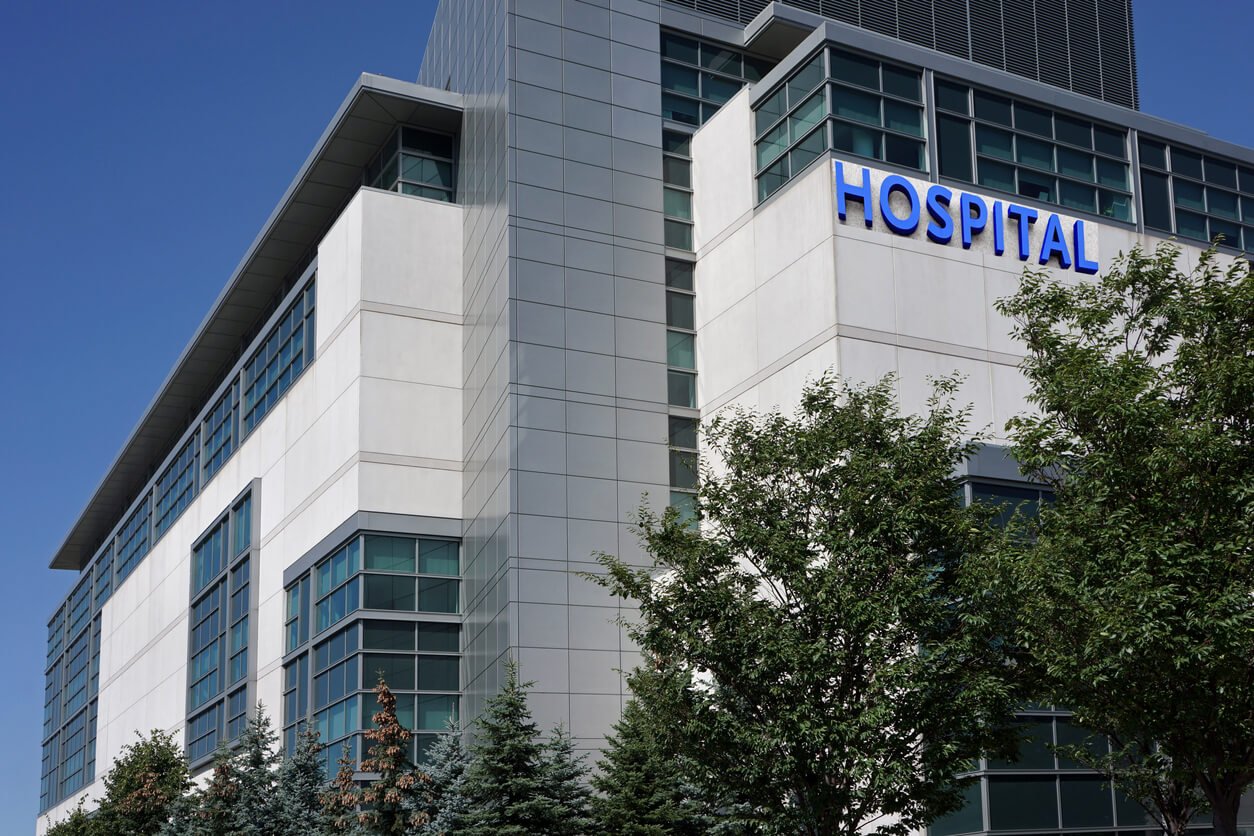
Ocean Robbins: Well, bless you for that. There’s the old saying that what doesn’t kill us makes us stronger. And some things maybe kill parts of us and strengthen other parts of us. I mean, there are losses that we can never really recover from, but somehow, we find a way to make some meaning out of them, to gain some value from them, to make something good of them. And some things like the loss of your sister are just too heartbreaking for them to happen in vain, right? So what an honoring of her life and memory that you’re carrying on serving others and helping so many other people not to lose their sisters and their mothers and their daughters and their friends because you’re helping them make changes that mean they never need medical interventions in the first place — or need a lot less of them.
So that’s always been my true passion: to find a way to give back to the world and do what I do around nutrition, which is putting out the fire before the fire starts. There’s so much beauty in that.
I’m also curious how you think that healthcare access might’ve played into all of that and how that influenced your journey.
Dr. Sean Hashmi: I think that’s probably the hardest part. We grew up in a very poor family. And we didn’t have insurance at that time, so we relied on the county system. My sister, my mother, and I would take three buses to get to the county hospital, which was about two hours away. The bus rides made it very, very difficult. And when we would get there, it was so hard to spend time with the doctor and for the doctor to understand how hard was it for us to get there. That left a very deep impression on me.
As doctors, we’re not just healers or teachers. When people come to our office, they put the most precious thing they have into our hands. What an honor, what a privilege for us to be able to take that extra minute to do something. And all of the basics that go into preventative care, that wasn’t something that we heard about. My mother, later on, had colon cancer, and we looked at all of the things that we could have done differently to prevent that from happening: my father’s prediabetic status, my uncle who died of diabetes — all of these are conditions that we associate with lifestyle that could be changed.
Preventing Disease Before it Starts
Dr. Sean Hashmi: In the hospital, I’m a kidney specialist. The number one cause of kidney disease that leads to dialysis is diabetes. And, of course, high blood pressure and obesity are tied together, so when we look at the healthcare system, we have such an amazing opportunity to be able to influence people early in the game, instead of waiting till something actually bad happens. That’s where I wish we were more proactive in healthcare in general.
Ocean Robbins: So there’s an increase in screening for disease, whether it’s Pap smears or various other tests that can be done, hoping to catch diseases earlier before they become too widespread or perhaps fatal. And that’s called prevention, but it’s really not prevention. It’s just early detection, right?
Dr. Sean Hashmi: Yes.
Ocean Robbins: But prevention is creating the circumstances out of which no disease happens in the first place.
Dr. Sean Hashmi: Right.
The Economics of Prevention
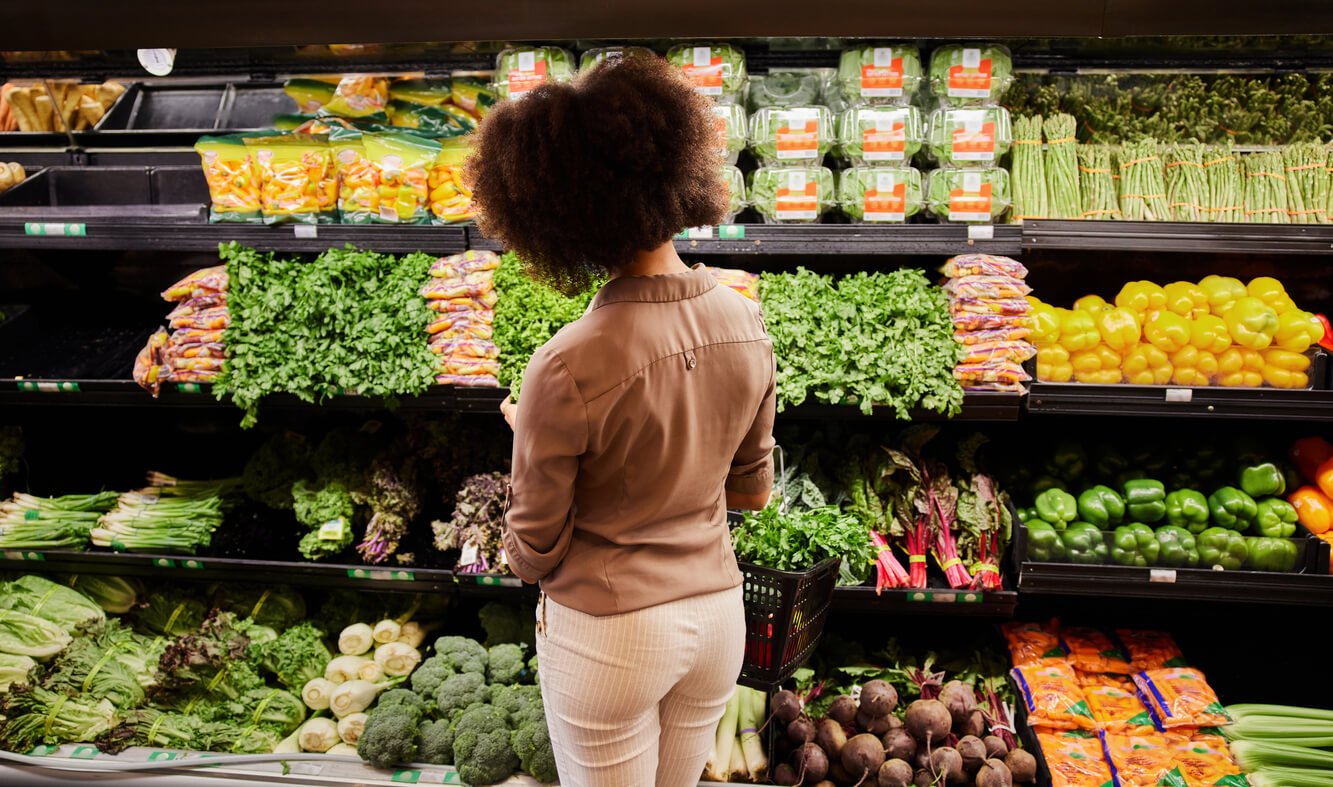
Ocean Robbins: You’re saying there isn’t much focus on that yet. And there’s this question I want to hone in a little more on, this question of how long does the patient have to stay in the insurance plan for it to become cost-effective to pay for prevention?
There was a recent study at Tufts University looking at the cost-effectiveness of Produce Prescription Programs. The researchers basically concluded that when doctors prescribe fruits and vegetables, or even more broadly, healthy foods, to their patients, that they can get significant results in terms of quality of life added and reduction in risk of cardiovascular disease and many other ailments. They ended up concluding that the cost per quality-of-life-year was generally considered on the lower end compared to a lot of the other things that are covered. And yet, we still don’t see this happening on a wide scale.
I wonder if most insurers are thinking, “Well, my gosh, our patients could leave next year and go to some other insurer. So what incentive do we have unless they have enough retention to bring down our long-term costs?” Do they even want to bring down their costs? Some people say that the bigger the pie is, the more they spend, the more they can charge, and that’s their game. How do the economics work here? And is that really one of our central problems in enhancing preventative care?
Dr. Sean Hashmi: It depends on how a healthcare organization is structured. The organization that I work for, that I’m very proud to work for, is designed as a nonprofit. What that basically means is we are designed to save money — not to do extra procedures to make more money — because Kaiser and Permanente, the Kaiser is the insurance arm. So we have our own insurance model, which means our model is built around the idea that the less we do, the better it is. What I mean by doing less is that the more we spend on prevention, the more we save down the road. What we find (at least with Kaiser Permanente) is that our members stay with us for a very, very long time. In fact, when we look at it, we will oftentimes find three generations of people that are already part of Kaiser Permanente. Three generations, already! We’ve been around since the ’60s. So as a result of that, there’s a huge incentive.
From Diet to Lifestyle
Dr. Sean Hashmi: But what you speak of is a really important point, which is: What we know from the data is that food prescription models work. The reason for that is that there is so much confusion on what to eat. Everybody’s an expert when it comes to this four-letter word — it’s just awful; it’s “diet.” Some clever person added a “t” to the word “die.” Now everybody’s running around trying to focus on a diet. But when we look at places like the Blue Zones, where there are the largest living populations of centenarians, what we find is that they don’t know the word “diet.” They just actually practice a way of life, which is to eat a predominantly whole foods, plant-based diet. They don’t even realize it has a name. It’s just, this is what we’ve always eaten.
For doctors, our first job really is to learn about this because there is a gap. It’s making sure that we have educational opportunities. Part of why I started our nonprofit, SELFPrinciple.org, was that out of all the research I did reviewing thousands of studies, there were four main concepts: sleep, exercise, love, and food — that is, SELF. So SELF Principle came up because those four concepts — as simple as they are — if you follow those, you have won two-thirds of the battle right there.
Now, when we look at things like genetics and everything, the biggest role genetics plays is about 30% in your life. Seventy-percent is lifestyle factors. And if you focus on that 70%, you can do great. For organizations, the more they invest in programs like partnerships where they’re giving patients easy access to fresh produce, easy access to fruits and vegetables, the better. We’re not talking anything fancy, just something like having farmers markets. One of the things I’m so proud of is that aside from the COVID time, we’ve always had farmers markets. What’s fantastic is I do a lot of my shopping once a week at our farmers market, which is right on our campus.
Changing Medicine From the Inside Out
Ocean Robbins: Yeah. That’s so inspiring. I’m a Kaiser Permanente member. And to walk in for an exam or a visit and literally walk through a farmers market on the way — on the hospital grounds — is so heartwarming. There’s a pharmacy with a “ph.” And now there can also be a “farmacy” with an “f,” as well. A place where patients can really see that this matters and that this is actually in the center of the hospital in some cases. Wonderful! So important.
I was also struck… I have to say, I had minor shoulder surgery a couple of years ago. And my surgeon actually recommended that I do this visualization. They sent me an audio track before the surgery. And they said studies show that people who listen to this track and visualize with it before, during, and after surgery have improved outcomes. They heal faster; they’re more likely to get the desired results; they have lower inflammation and less stress. I was like, “Okay, great.” And here’s the funny thing: I’m the kind of person who would do that. I’m the kind of person who might’ve written a recording like that, but I still probably wouldn’t have sought it out if my doctor didn’t actually send it to me.
So I listened to the recording many times before the surgery. And I pictured how my body was going to respond, how I was going to be relaxed and at peace, how angels were going to surround me, and I would be protected and guided and my shoulder would prepare to open up to receive the knife even before it came. Then my shoulder would heal right up perfectly. And the surgeon would be guided to do just the perfect thing. I saw all that, and I don’t know if it actually changed my outcome, but I certainly healed very quickly.
They also recommended that I have headphones on during the surgery to listen to another recording they had specifically for that moment, and then there was another one for afterward. Some people might call that woo-woo or whatever, but when my doctor told me to do it and said there was science backing up its efficacy, I was like, “All right, I’m in!” And then I thought, wow, the world is changing. If a major hospital has a farmers market in it, if there are no vending machines for Coke or Pepsi in Kaiser anymore, which is also true, by the way. Thank you for your leadership on that. If we’re being prescribed visualizations before, during, and after surgery, these are big changes happening.
A Changing Culture
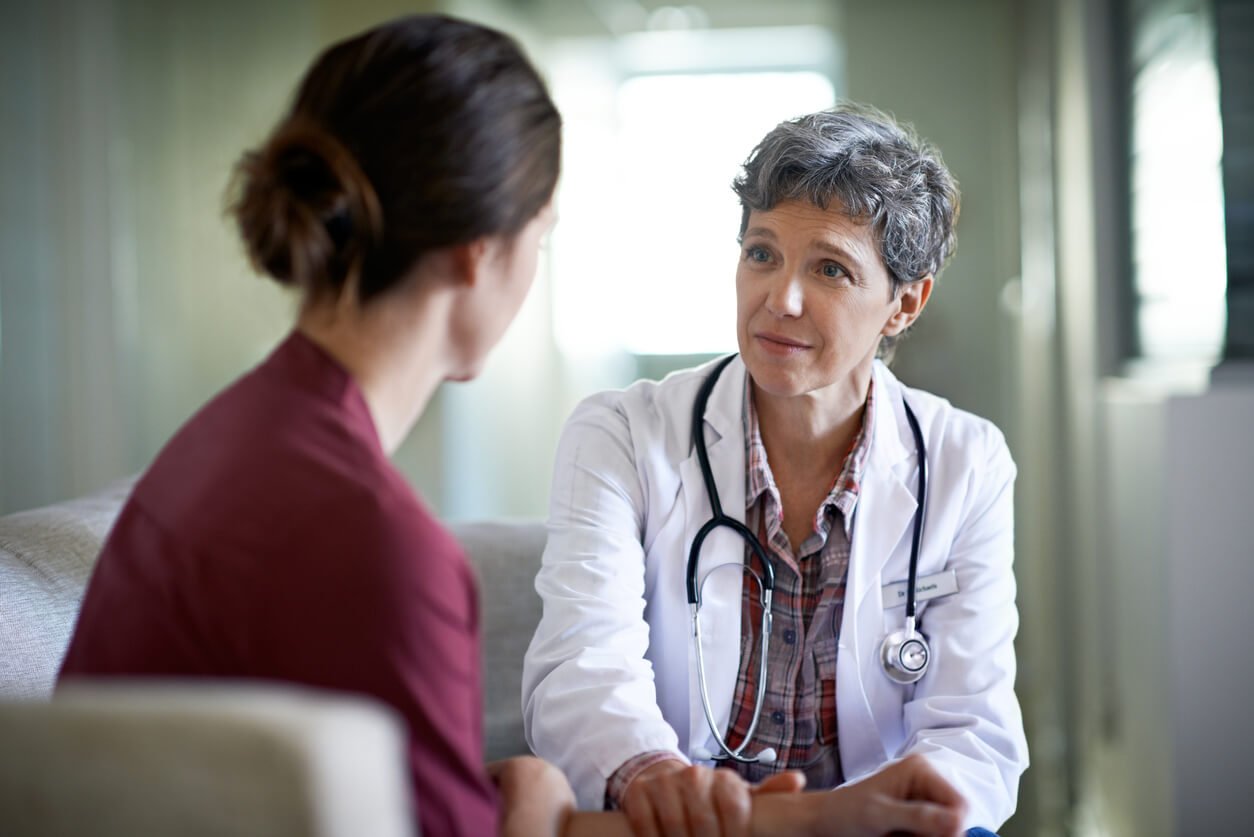
Ocean Robbins: I also notice that after every physical exam with my doctor, I get a follow-up email with a little quiz asking, “Did your doctor discuss diet and lifestyle with you?” And I’m thinking that this data is being gathered because somebody wants to track it. Because there’s a system-wide encouragement for doctors like mine to discuss diet and lifestyle with their patients. I’m thinking there are probably not a lot of other healthcare systems doing this, but Kaiser really is leading the way. Do these kinds of changes give you some hope?
Dr. Sean Hashmi: Oh my God, absolutely. When I go to work every day, I’m surrounded by incredibly passionate people. So in Southern California, where I serve in my current role, which is the regional director of clinical nutrition and weight management, I have physicians who are absolutely passionate about this work. They’re doing the research; they’re bringing the studies; they’re giving lectures to other doctors. There is so much knowledge that’s being distributed right now! It’s incredible. We have people who are getting boarded in lifestyle medicine and people getting boarded in obesity medicine. Now, we have people getting dual-boarded in both of them because they want to know all of the details.
In the work that I do, we lay nutrition and lifestyle as the foundation. Before we talk about anything else, we find that that’s the most important conversation — and we always want to meet the member where they’re at. We ask for permission to talk about these things, so they never feel like the doctor is telling them, “You have to go out and do this.” No. “Mrs. Spit, what are you able to do? Let’s talk about it. Can I have permission to talk to you about your weight today? What works for you? What are your barriers?” And you’re fascinated by the stories and how difficult it is.
Starting With Small Changes
Dr. Sean Hashmi: You find that they don’t need to go and do something drastic, even as simple a thing as adding a few more fruits and vegetables to their plate is a great start. Next time they come, we talk about something else. So, those little incremental things are kind of like what BJ Fogg talks about in his book, Tiny Habits. It’s amazing that organizations value that, that we have physicians who value that. And we serve primarily as teachers of patients, and teachers of other doctors.
Ocean Robbins: Yeah, thank you so much for that. In case anyone’s wondering, this is not an advertisement for Kaiser Permanente. We’re here to talk about healthcare and how we transform the system. Kaiser has got a long way to go, too. But we are here to share stories of solutions and possibilities because I think they give us hope and show what’s possible – not just at Kaiser, but for everybody. Kaiser is only in about 12 states, but we’re working all over the world here. A lot of people don’t have access to Kaiser. But all of us can learn something here about what’s possible and can advocate for more change everywhere in medicine.
Dr. Hashmi, I’ve often thought that a doctor who doesn’t know about food is a little bit like a firefighter who doesn’t know about water. Food really is the foundation of health. What you eat literally becomes you, and it dramatically impacts your likelihood of dying of certain diseases or living a long, healthy life. Do you see it similarly?
Eating for Health
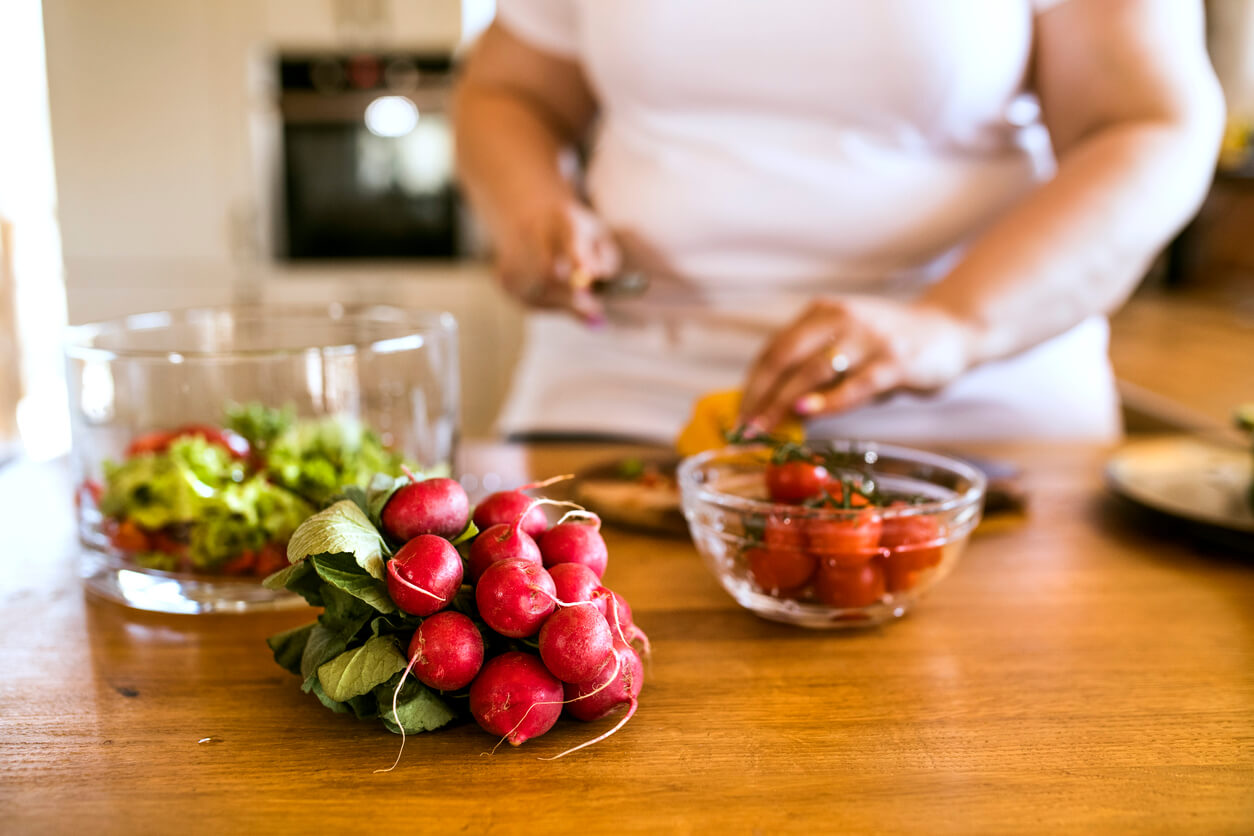
Dr. Sean Hashmi: I think the challenge, at least on the physician’s side — when it comes to training, it’s not that we have a lack of knowledge. What’s happening is, there’s so much misinformation that it’s making the whole process very, very confusing. Sometimes, I’ll have physicians come and talk to me about the ketogenic diet. They’ll say, “I have patient X, who’s lost 150 pounds on the ketogenic diet.” My response to that is, okay, that’s wonderful that you were able to get somebody to commit to healthier changes. Now, we know about the ketogenic diet and weight loss. We get it. But I can also starve you, and you’ll lose weight. The question is, are we getting weight loss, or are we getting health?
What I tell every single person when I give a talk is that if you go for weight loss, you get weight loss. If you go for health, you get a better brain, better vision, a better heart, better lungs, better kidneys, a better GI tract, and you get weight loss with it. So, from that perspective, our job is to focus on health. If we get you down the right healthy road, we can stop the body-shaming because that’s a very real aspect. Patients may have lost 150 pounds, but the doctor tells them, “You need to lose more weight.” Let’s celebrate what you have done because if I celebrate with you, you feel more connected to me. And you’re more likely to listen to me.
A Simple Prescription
Dr. Sean Hashmi: When it comes to organizations, the best we can do is to start with medical schools, start with the education piece in medical schools. If you start teaching students there, they are open; they’re receptive. It’s before the point where they’ve had so many experiences that make it really hard to break down those walls. Then, in residency, to actually have dieticians involved so that there’s a way to understand. Right now, we have a different diet for CHF, a different diet for diabetes, a different diet for kidney disease.
If you go for weight loss, you get weight loss. If you go for health, you get a better brain, better vision, a better heart, better lungs, better kidneys, a better GI tract, and you get weight loss with it.
One of the things I told, at least our local folks, was that it’s all actually the same diet. It’s not a different diet. We’re confusing people by making all of these nuanced statements. But it turns out if you’re looking for a low sodium diet, it’s a whole foods, plant-based diet. If you’re looking for a diet that’s ideal for kidney patients that’s lower in protein, that’s a whole foods, plant-based diet. If you’re looking for a diet for diabetics that is lower on the glycemic index scale, that’s also a whole foods, plant-based diet. You have all of the same concepts found in one dietary pattern.
Ocean Robbins: Yes, so true. I often reflect that if you drive your car into a brick wall, the death certificate might say, “impalement by a brick wall.” But the truth is, it was your driving that was the real cause of death. The modern diet and lifestyle are kind of a recipe for chronic illness of all kinds, and we don’t know whether it’s going to show up as cancer, type 2 diabetes, obesity, heart issues, or maybe all of the above in many cases. But, some sort of disease is inevitable when we don’t treat our system optimally. So, I think it’s so important that you’re learning how to bring the significant authority that you carry as a doctor to your work with patients who trust you with their health and their lives, to try to help them make changes.
Sticking to the Plan
Ocean Robbins: That said, I’m struck by how often people who know what to do still can’t do it. Sometimes people will even have a leg amputated. They could see it coming, and their doctor said, “You need to eat differently.” They actually couldn’t do it, even with everything at stake like that. Do you see this happen? And what do you think it is that keeps people from doing what they know they should, even when their lives are on the line sometimes?
Dr. Sean Hashmi: This is probably one of the hardest parts of my job. As a kidney doctor, one of the things we take care of is patients whose kidneys fail, who end up on dialysis. When they end up on dialysis, some patients — not all — some patients feel like, “Look, I’ve already lost the battle, what’s the point?” Sometimes it’s even harder for them to follow your advice. I’ve had patients where they’ve lost both of their legs; they’ve lost their arm; they’ve lost fingers; they’ve lost eyesight in one or both eyes, and yet, they still can’t give up their junk food.
You see, when we talk about things that are addictive, the three most addictive substances that we have in food are salt, sugar, and fat. And the most addictive is when you combine all three in one. You can look at something like potato chips and wonder. I remember there was a brand, Lay’s, that always had that commercial: Bet you can’t eat just one. They are absolutely right because when you see the portion of the brain that it lights up, and you see the high that people get, it’s the same place that things like cocaine and heroin light up, so you know how powerful that statement is.
Dealing With Food Addiction
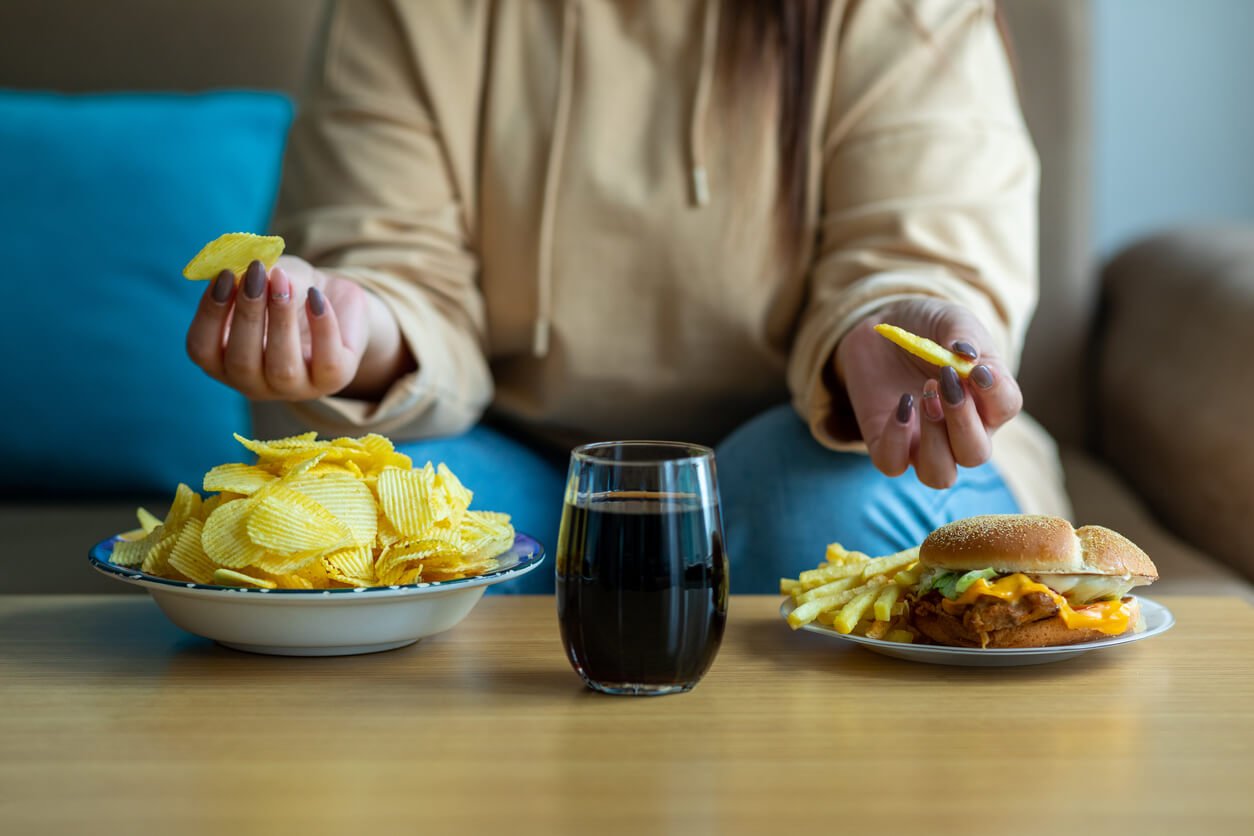
Dr. Sean Hashmi: When we look at a whole foods, plant-based diet, the reason it works so much better is that it’s naturally low in salt. Naturally, it has beautiful amounts of fiber and water. When you’re getting sugar from fruits, it doesn’t have the same effect as when you’re getting sugar from sodas. People say things like, “I have this craving, and I want to get diet sodas.” And the issue you face is, as long as they go for their diet drinks, which are anywhere between a couple hundred times sweeter and as much as 26,000 times sweeter, you are creating this massive addiction to sweetness. That’s why when you have an apple, it doesn’t taste as sweet.
So this barrier is an addiction; it’s a food addiction. The problem is that as a society, we haven’t gotten to the point of saying, “How many of us have some degree of food addiction?” I would say every single one of us. We were designed to like stuff that was sweet, and we were designed not to like stuff that was bitter. That’s evolutionary. We just made the sweet portion 26,000 times sweeter.
Ocean Robbins: Yeah, absolutely. And we live in a society where — just to follow the metaphor — it’s as if cocaine and heroin were available on every corner, and we were shamed by family members for not consuming them, and they tasted good. So we can see how hard it is to overcome those addictive pulls. We’ve got baby bottles with Coca-Cola logos on them. We are trained from early childhood to develop these addictions. And we’re evolutionarily wired for it. It’s a lot to overcome. And, sometimes pain pushes. Sometimes people really are motivated to make big changes by feeling that their life is on the line. Other times vision pulls us — we see a possibility and we want to move into it.
The Missing Information
Ocean Robbins: It doesn’t help, though, when doctors are fundamentally clueless about the link between food and health. My aunt was dealing with serious cancer issues. We didn’t know if she’d live or die. She ended up making it — thank goodness — after life-altering surgery and immense amounts of treatments that were devastating for her health and well-being. But not once in the entire journey did any of her oncologists say a word about diet. I’m sure they thought that they were being kind, that they didn’t want to add more stress, that she was going through enough already, that it was hard enough for her to eat. Or why on Earth would they want to make her scared about the foods that are familiar? So they thought they were being reassuring and loving.
But I don’t think it was so loving because my aunt wanted to live. Now that she’s on the other side of it, the last thing she wants is a recurrence, or for cancer to pop up somewhere else in her body. Her doctors were not telling her the data, which is, of course, no diet is a cure-all against cancer. But you can cut your risk by 50% or so with diet and lifestyle. Someone in her position who wants to do everything possible not to end up back there again, or worse, should at least be told what the information is, and she wasn’t.
Unfortunately, she doesn’t always listen to me. Maybe she’ll listen to you. But we have work to do, don’t we?
Dr. Sean Hashmi: We do.
Ocean Robbins: I’m curious, how do you see medicine changing? I know that right now, doctors are less likely than the general population to be overweight or obese. But 40% of doctors are still overweight. And one in four are obese. A lot of doctors have their own habits to deal with here. What’s it going to take to truly get food front and center here?
The Obesity Paradox
Dr. Sean Hashmi: With modern medicine becoming more and more expensive, more and more organizations are starting to look at this concept, especially on a governmental basis as we start to have folks like yourself who are making such a strong push for programs that actually support nutrition education, support looking at preventative care, which makes such an impact. Healthcare, the way it’s going right now, is going to become so expensive that it will be impossible unless we’re able to add these very basics in.
I’ll tell you, when you were talking about your family member’s story about cancer, there used to be an old saying —and this is not going back years ago — where there was this concept of an obesity paradox. The obesity paradox was this: If you had somebody who was older, or if you had somebody with cancer, the paradox said that if they lost weight they actually did worse. So in the old days, what the oncologist and a lot of other folks did — and especially as patients got older — was they would never ask people to lose weight. Even in end-stage renal disease, it was the same obesity paradox.
My research was looking at what I called “the obesity paradox paradox.” What that essentially showed was that if you lost weight, it wasn’t that you lost weight and then your mortality went up, it was the loss of lean body mass that could be a problem. What that meant was that if you ate healthy foods, you would naturally lose body fat, and there was nothing wrong with that. If you moved more, you would build lean muscle. If anything, all that actually improved your chance of survival.
The Healthy Plate Model
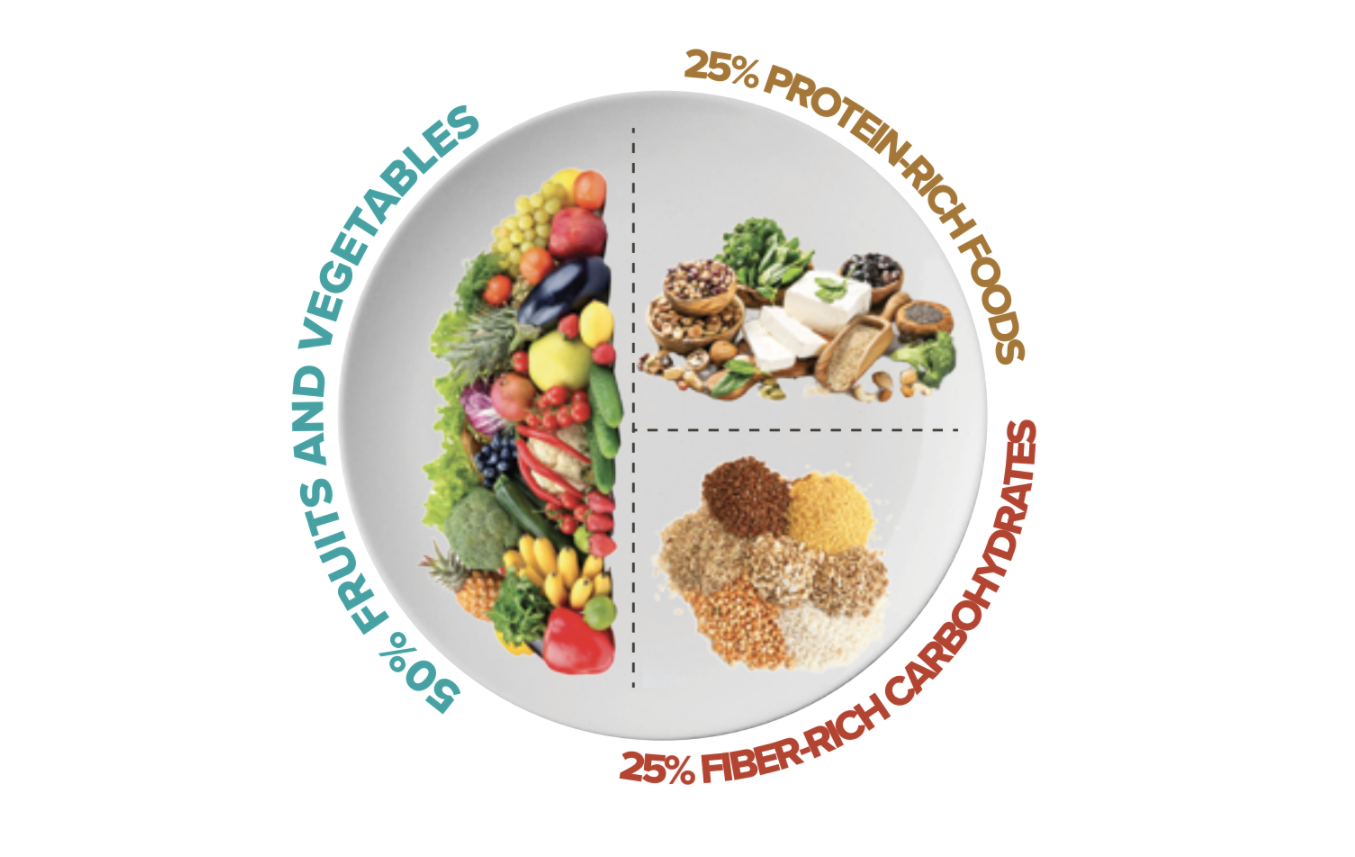
Dr. Sean Hashmi: So this concept that they had back in the day was just a lack of information. And now, with healthcare organizations, we have a lack of information where it feels like people are thinking things like, “Why don’t we come up with a pill that costs a million dollars that we know nobody can truly afford?” Instead, we could start these people on eating lots of leafy greens early on in the game, and focus on a healthy plate model (not a pyramid model). That’s why, personally, I’m a big proponent of the healthy plate, which has half your plate full of fruits and vegetables, and a quarter of your plate full of protein. Tofu, by the way, is a wonderful source of protein, and so are beans and lentils. The quarter of your plate that’s leftover is healthy starches; whole grains are an excellent source. If you do that, that’s your healthy plate model.
One of the programs that I’m involved in for weight loss we built around the healthy plate. Harvard has one; Health Canada has one. All of these organizations are promoting the same message. So, there is a movement. But I have to tell you, the work that you’re doing has a lot to do with the amount of pressure that these organizations are facing in driving this change.
Addressing Systemic Problems
Ocean Robbins: Well, thank you. One of our campaigns has been to work with the American College of Lifestyle Medicine to change medical school education. We realized that a lot of schools teach to the test, and that the National Board of Medical Examiners has a bank of questions that are given to medical school graduates. They have to pass the test in order to become licensed as physicians. And in these tests, out of 15,000 questions in the bank, how many do you think related directly to diet and lifestyle for disease prevention? If you guessed zero, you’re pretty right on.
So we worked with the American College of Lifestyle Medicine to create a bank of 1,000 questions that are all rigorously researched and academically on point, and these are now being added as a resource for the medical schools. The next step is to advocate to get enough schools to use them that they become part of the mandatory portion of the bank instead of the optional portion. But, certainly, I think it’s an important step. And our members stepped forward and helped raise the funds to move this along.
We’re now focused on two other campaigns: the Produce Prescription Program and Double Up Bucks. I want to talk about Double Up Bucks for a second, and the equity and social justice side of all this. Because, as you well know, a lot of people can’t afford healthy food. In the current context, Twinkies has 14 government-subsidized ingredients, and broccoli has none. We have tens of billions of dollars in taxpayer subsidies that are bringing down the price of commodity crops. And this is essentially subsidizing factory-farmed meat, high-fructose corn syrup, white flour, and processed junk food. And they’re not bringing down the price of fruits, vegetables, nuts, and seeds — the things we should all be eating more of. It’s creating a marketplace distortion, essentially.
Creating Sustainable Systems
Ocean Robbins: On the other side of things we have a glimmer of hope, I think. The SNAP Program — which unfortunately more than 50 million Americans depend on in order to feed their families — is a critical lifeline for a lot of people. The good news is that Wholesome Wave has a program for doubling the value of SNAP dollars for fruits and vegetables. This is currently being accessed by about 500,000 people on a pilot basis in 20 states. What they’re finding is that when people are given access to this, they buy more fruits and vegetables; they eat more fruits and vegetables, and, of course, they’re healthier because of it. So, I find a lot of hope in that.
If we want healthy, ethical, sustainable food for all, which is our mission at Food Revolution Network, I think that one of the key things we have to look at is how we can create systems that make it easier for especially the people that are having the hardest time to do the right thing. Right now, unfortunately, we have almost the opposite, where it can feel like it costs your whole paycheck to eat whole foods because of the subsidy systems.
So I’m curious how you think we can bridge this gap because right now so many people are struggling to make ends meet. And, statistically, the poorer you are, and the darker your skin color, the more likely you are to struggle to feed your family healthy food, and the more likely you are to die prematurely from lifestyle-induced illness. Do you have any insights on this and on any steps you think we could take as a society to help shift things?
Food Access and Inequality
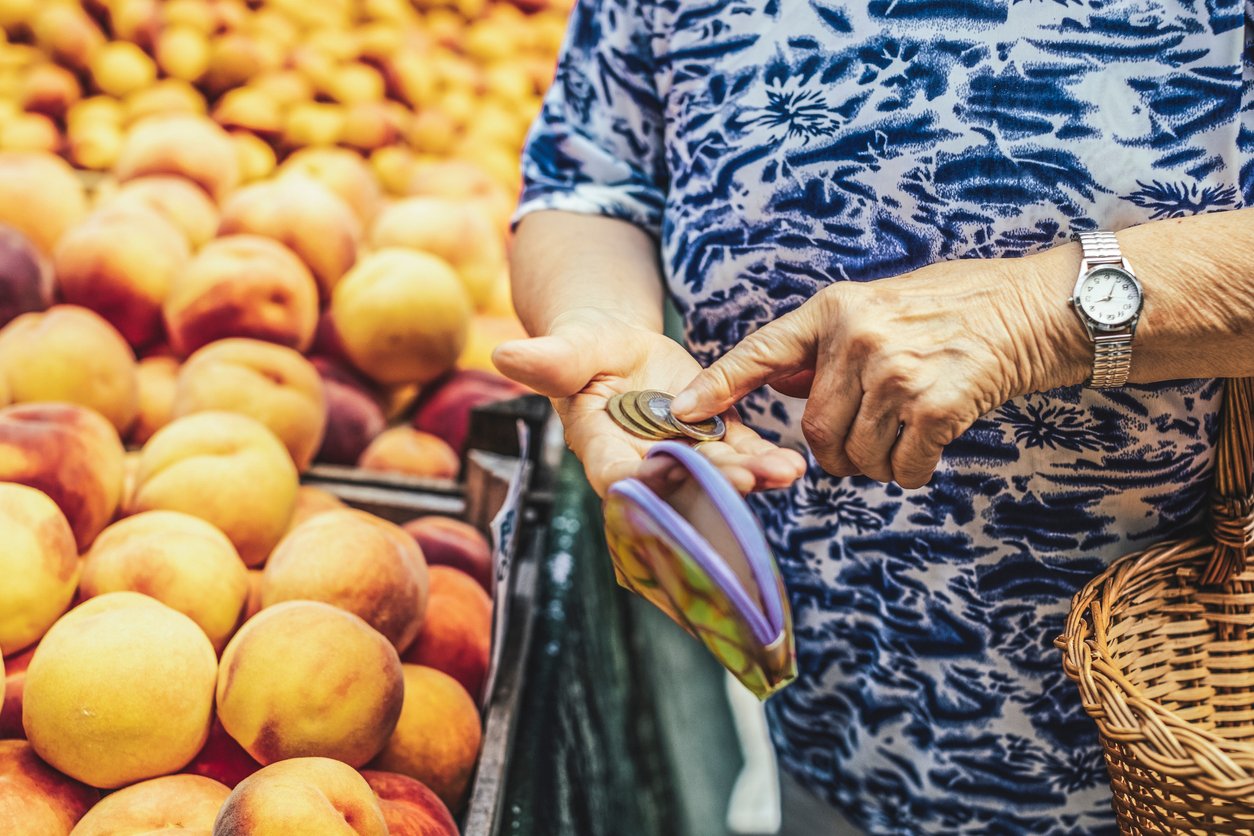
Dr. Sean Hashmi: Well, I’ll tell you, when I came to America, I was 10 years old. I grew up in Gardena, which is in southern California. And I went to school in Compton, which unfortunately has been popularized for all of its negatives and none of its positives. But I can tell you that every grocery store we ever went to had all of the fast food available. The moment you walked in, it was right there for you. And I remember being really, really hungry. I had either a quarter or 50 cents in my pocket, and there was Taco Bell or some fast food place I could rush into. It was very, very cheap, and it was easily accessible.
If you want people to eat more fruits and vegetables, and you have already created an unfair advantage for every other processed food to be easily accessible and cheap, the only way to level the playing field is exactly what you’re describing. You have to make food readily available and cheap, make fruits and vegetables subsidized, have these big corporations get involved in the partnerships, and be able to say, look, yes, we will do the Double Up Bucks. We will go ahead and create opportunities for people to be able to focus on these foods more. That becomes so important.
One of the trends that I’m seeing now — and I’m glad that people are starting to think about a whole foods, plant-based diet — but a lot of the new products that are coming out, frankly, the people who are very poor can’t afford them. So even though there is a movement for shifting away from meat and moving towards fruits and vegetables, my fear is that the gap between the haves and the have-nots is actually getting bigger. Even in our plant-based movement, I believe that it’s getting bigger. We need to look at those people who are barely making rent, who are working two or even three jobs and coming home dead tired, and their bellies are hungry, and their children are hungry. What they want is cheap and fast.
Reversing the Vicious Cycle
Ocean Robbins: Right. And when you’re in a state of stress, you’re more likely to want things that relieve that stress quickly, which are going to tend to be things that give you a rapid burst of blood sugar, for example. So, there’s also a biological craving at a time like that. No one is inclined to save water if their house is on fire. When you’re in a state of emergency, you’re inflamed systemically, and your family is hurting and struggling and scared, you’re much more likely to take short-term action that helps you make it through the day rather than think long-term. These things create vicious circles, and, unfortunately, they deepen because the primary cause of bankruptcy in the United States is medical care. So we have generation after generation of people who are dying penniless, unable to leave anything to their children because whatever they may have accumulated or saved over a lifetime of hard work gets eaten up by medical bills at the end. To me, this is tragic.
But it’s also a little glimmer of hope. Because here’s the thing, folks: If we can turn some of these cycles around, then we can end intergenerational cycles of poverty. We can actually start to shift the economic context if we strategically invest in the health and well-being of low-income communities. In time, they will become less low-income because there’s nothing more debilitating to your earning power than physical pain, brain fog, fatigue, and chronic illness. There’s also nothing more debilitating to your bank account than chronic disease that robs your family of whatever meager resources you may have accumulated.
Knowing Your Why
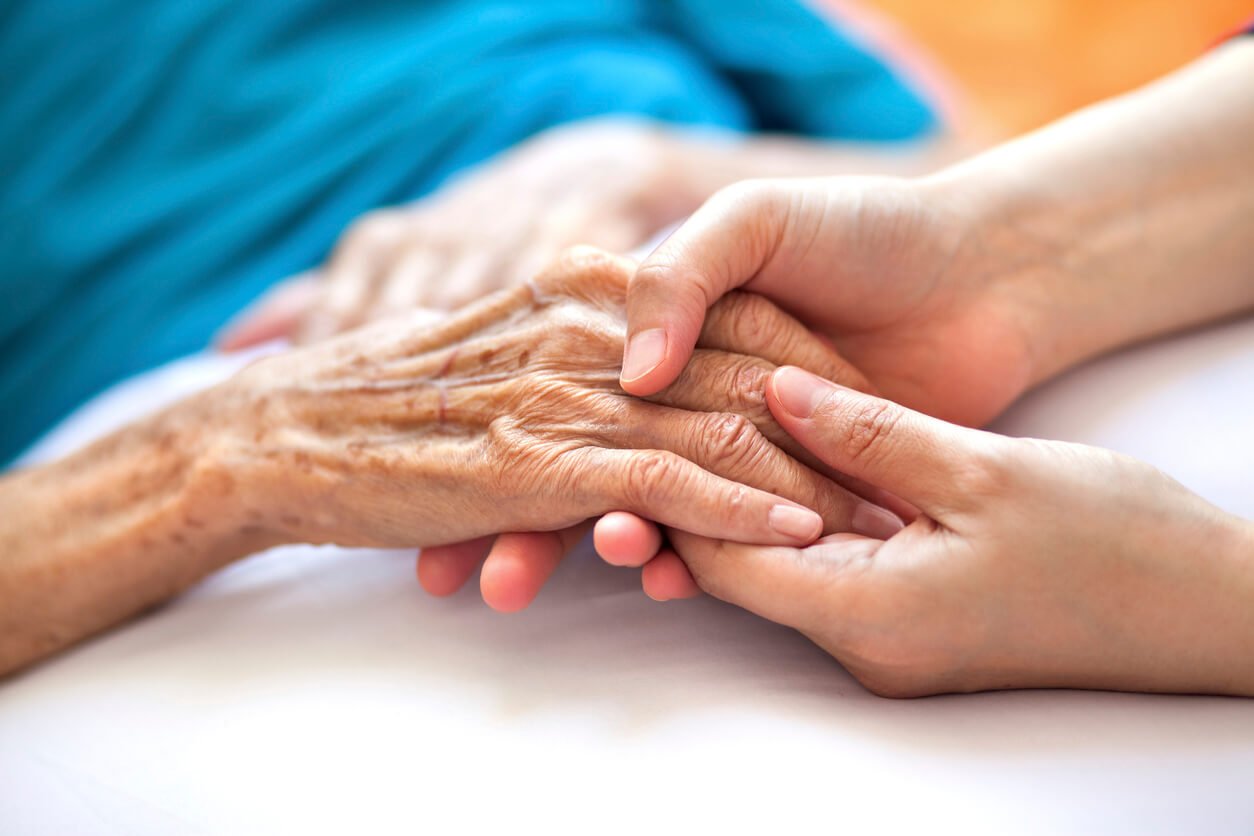
Ocean Robbins: So, we’re at a place now where any caring human who wants to see economic opportunity and freedom for all needs to ask, how can we up-level the health of the communities that are struggling the most right now? You keep coming back to this point that a lot of people are really confused about what’s healthy, and I think that’s critical because there’s no shortage of doctors telling their patients they need to eat better. But what does that actually mean? I think Michael Pollan said it pretty well: “Eat food, not too much, mostly plants.”
Dr. Sean Hashmi: Yes. My seven favorite words that I have used in every single lecture I’ve given for the last 10 years. So, yes.
Ocean Robbins: Absolutely. So I’m curious, this is a question you may not get too often, but you have a background in Taekwondo. And I’m curious what martial arts has taught you about the principles that are needed to create positive impact in the world and to move through life in a good way.
Dr. Sean Hashmi: It’s really interesting. Well, first, I’ve never been asked this question, so that’s fantastic. But I think the beauty that I found in martial arts was that it gives you self-discipline. As you start to develop that self-discipline, and you start to get that confidence in your own abilities, what you also start to notice is the most important thing in your life, which is your why. My whole life is all about what is mine. Why am I here? I’m grateful to my mom and dad. I’m lucky to be born. I’m lucky to have health, and so forth. But what am I really doing?
Part of martial arts, what it teaches you, is to help your fellow man — whoever that person is in front of you. If they’re in need, and you have the ability to defend them, it teaches you to defend them against wrongs — to promote justice. There are all these codes that I remember from my Taekwondo studio. Every day when we would start a class, we would take an oath. We would start our class with the oath that we would defend whoever was in need. Well, what I do now is I defend the people who are in need; I defend the defenseless. This whole conversation today is about how we promote this message of health. How do we get large organizations to focus on prevention, not just treatment, not just waiting till the disease is there? That’s what martial arts is all about. Yes, it’s great to be able to learn all the moves and strengthen yourself. But, really, martial arts is designed to make you a better human being. And the definition of a better human being is, what are you going to do for the person in front of you?
A Part of the Solution
Ocean Robbins: Yeah. Well, that’s a beautiful definition, isn’t it? What are you going to do for the person in front of you? I remember Abraham Lincoln once said, “I care not much for a man’s religion whose dog and cat are not the better for it.”
Animal rights activists have built upon that and said, “Okay, look, we need to treat animals like sentient beings that deserve our respect.” We could also apply that to every domain of life, couldn’t we?
At the end of the day, who you are as a human being has a heck of a lot to do with how you impact those around you. Are you a source of love, of health, of wellness, of contribution? I believe that in a world that is hurting like ours is today, with so much suffering and pain, there is something of a moral imperative in each of us to be a part of the solution.
Standing by is really not an option anymore, not with all that’s at stake. As human beings, I don’t think we were born just to live and cope and survive and die. I think each of us was born with something to give, something to contribute, something to bring to the world. So the question is, what now? How can we be a part of the solution on this planet? And to me, health is a means to an end; it’s not an end in itself. I want to be healthy, so I can love more, live more, and serve more. So I can help others be healthy, so they can love more, live more, and serve more. So that we can all do what we were born to do and bring about more beauty, peace, dignity, freedom, and joy on this planet.
So, Dr. Hashmi, I just want to thank you for your leadership, your wisdom, and the profound impact you’re having — not just on your patients, which is tremendous, but on so many other patients, on the way that medicine is practiced, on the way that it’s thought of. And I hope that one day, doctors really will be applying lifestyle medicine first, second, and third (and, of course, implementing all of the medical technologies, drugs, surgeries, and so forth when necessary). If they do, it will be in no small part because of you and others like you that have led the way.
Dr. Sean Hashmi: I look forward to that day, and I hope in our lifetimes we both get to see that!
Ocean Robbins: Yes, me too. All right, thank you so much.
Dr. Sean Hashmi: Thank you for having me.
Tell us in the comments:
- Did you learn anything from this interview that inspired you?
- What barriers to healthcare and/or healthy food have you experienced?
- Of Dr. Hashmi’s four SELF principles — sleep, exercise, love, and food — which are you doing well with?
Feature image: iStock.com/id-work
Read (and Watch) Next:
- Bridging the Health & Nutrition Gap: An Interview with Benjamin Perkins of Wholesome Wave
- Fight Disease With an Anti-Inflammatory Diet + 7 Foods That Fight Inflammation
- Food Inequality: How Poor Nutrition Affects Health, Wealth, & Opportunity (And What We Can Do About It)!
- VIDEO: John Robbins Interviews Michael Pollan

